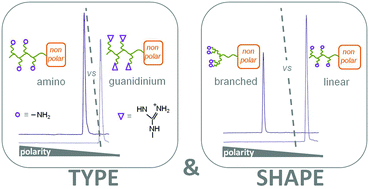Linear versus branched poly-lysine/arginine as polarity enhancer tags†
Abstract
The design and synthesis of Lys- and Arg-containing peptides as solubilizing tags were studied to evaluate their influence on polarity. The relevance of spatial arrangement of polar groups, in α- or ε-amino positions, was confirmed by chromatographic analysis of a rational PolyLys-based synthesized structure. The most promising of the solubilizing tags here analyzed was conjugated to a commercial water-insoluble drug (indomethacin) as proof of concept.


 Please wait while we load your content...
Please wait while we load your content...